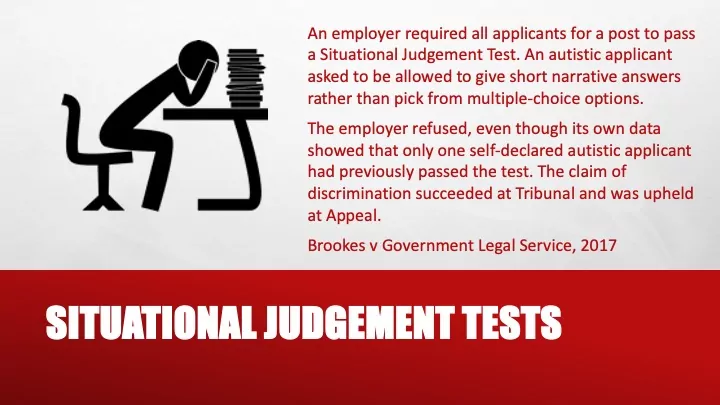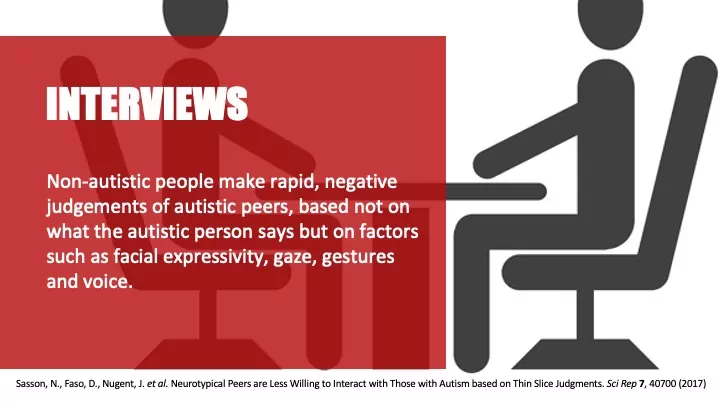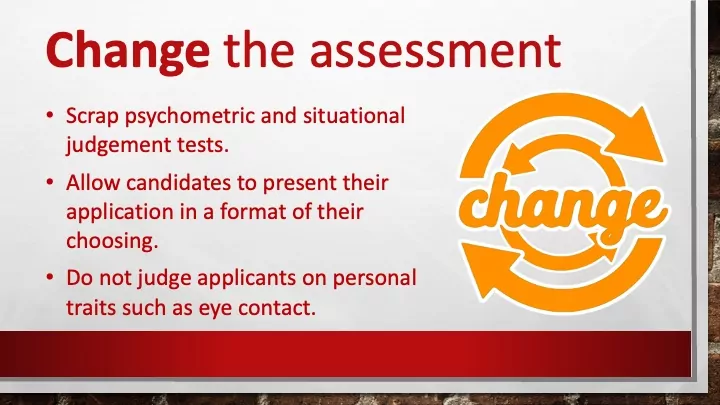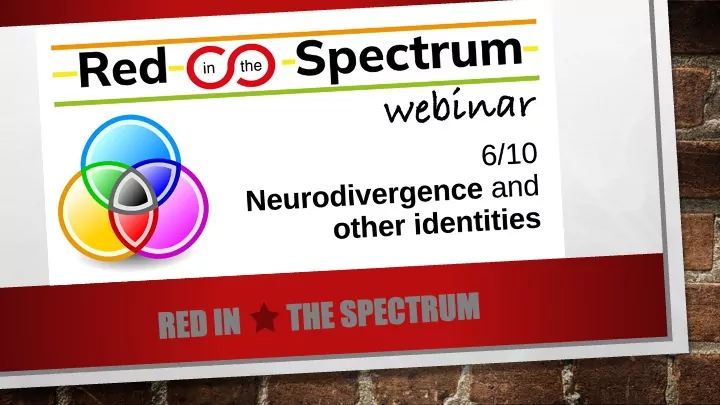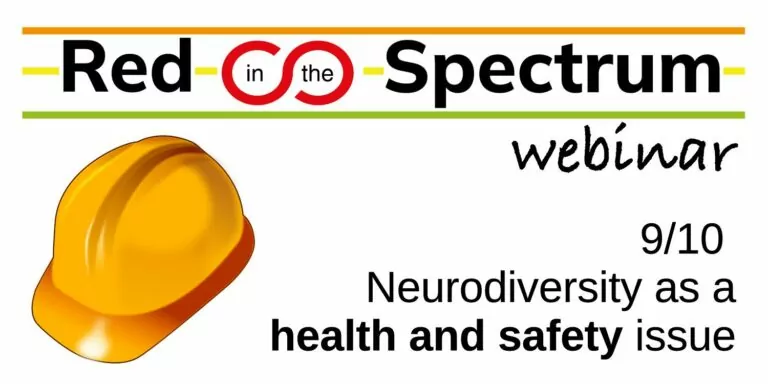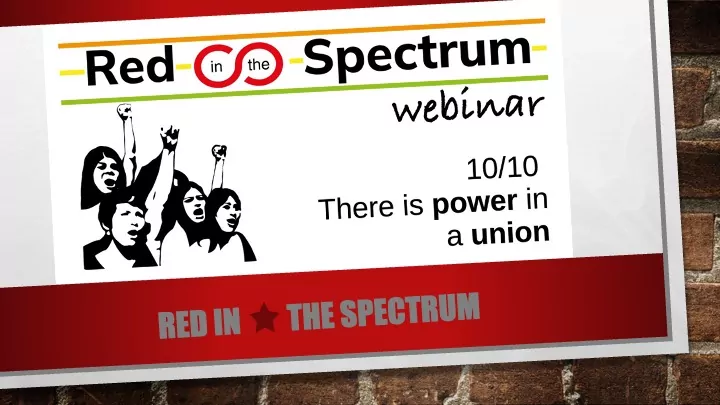Neuro-inclusive recruitment: Webinar 8
Neuro-inclusive recruitment
The eighth of Red in the Spectrum’s series of webinars on Neurodiversity at Work discussed neuro-inclusive recruitment.
- How do job specifications and adverts discriminate against neurodivergent jobseekers?
- What barriers do application forms present?
- How can assessments be neuro-inclusive?
Why discuss neuro-inclusive recruitment?
“Selection and progression depends on being neurotypical. Neurodivergent applicants and employees hoping for in-work progression frequently find themselves disadvantaged by the fact that their characteristics are different from what is expected; this can be misinterpreted as inability, incompetence or your face not fitting’.” (source)
Neuro-inclusive recruitment: participants’ poll
Which part of the recruitment / promotion process do you have difficulty with as a neurodivergent person?
- understanding job adverts 43%
- applying online 57%
- applying on paper 57%
- interviews 71%
- psychometric / situational judgement tests 71%
- exams / written tests 43%
Neuro-inclusive recruitment: Job specifications and adverts
Vague and generic
Job specifications often consist of all-round general competencies eg.
- “teamwork”
- “basic admin”
- “line management”
- “dealing with customers”
This hinders neuro-inclusive recruitment as these are not specific enough for many neurodivergent people to know whether they are suitable for the job.
Unnecessarily high academic requirements
- Job specifications often require a minimum level of academic qualifications.
- This discriminates against neurodivergent people who did not gain qualifications that reflect their real abilities.
- eg. Dyslexic people are more likely to leave school with low qualifications. (source)
Irrelevant personal characteristics
- Job specifications may include personality traits not relevant to the job.
- eg. London Underground advertised for station assistants who were “friendly, approachable and have an outgoing personality”. (More information here.)
- This hinders neuro-inclusive recruitment as it excludes neurodivergent people who could do the job but do not have these traits.
Non-essential requirements
The Equality and Human Rights Commission Code of Practice gives an example of how including non-essential requirements in job specifications can hinder neuro-inclusive recruitment:
An employer uses a person specification for an accountant’s post that states ‘employees must be confident in dealing with external clients’ when in fact the job in question does not involve liaising directly with external clients. This requirement is unnecessary and could lead to discrimination against disabled people who have difficulty interacting with others, such as some people with autism.
Other problems
Job specifications and adverts can:
- be unclear
- use jargon
- contain an overwhelming amount of
All these hinder neuro-inclusive recruitment as they can deter neurodivergent people from applying.
Changes to reduce discrimination and create neuro-inclusive recruitment
- Plan A: changes to recruitment and promotion processes
- Plan B: reasonable adjustments for individuals
Change the job specification
For neuro-inclusive recruitment, ensure that job specifications include the following.
- required skills only
- essential qualifications only
- specify skills and work activities
- clear adverts, free from jargon.
Neuro-inclusive recruitment: Job specifications and adverts
Contributions from participants
A big problem is working out what the job spec actually means. Turns out it’s almost never what’s written.
I score off the chart as introverted – which I am – but I’ve learned to work really well in teams – but I don’t get the chance to demonstrate that.
Bad experiences: promotion criteria being neurotypically coded; very hard to figure out what they actually need from that job level.
 Neuro-inclusive recruitment: Job applications
Neuro-inclusive recruitment: Job applications
Difficulty with forms
Over 80% of neurodivergent job applicants have difficulty with application forms sometimes, often or always. (source)
Text-heavy
- “Too literacy-based, resulting in working memory overload in paper-based applications” (WAC)
- Dyslexia-unfriendly
Complex
Application forms often ask for:
- a lot of documentation eg. passport, driving licence, proof of right to work, birth certificate
- exact employment / education history.
This discriminates against neurodivergent people who may have difficulty accessing this information.
Neuro-inclusive recruitment: Gaps in education and employment history
Contributions from participants
I have gaps in my education and employment history due to mental health issues (related to being neurodivergent). I really struggle knowing what to do with that on an application form.
I’ve been questioned over times off work spent caring for neurodivergent mother and my own issues.
For teaching jobs, you have to account for all gaps.
Red in the Spectrum suggestion: Write “self-improvement” for time out of employment, education or caring.
I like the idea of self-improvement.
It’s needed in the fields where I work as it’s with very vulnerable people, but I’m not confident that trusting to me to fill in a CV is the best way to ensure I haven’t been in trouble for anything.
A lot of jobs now ask for a reason if and why you have time off over three months.
Honesty can work against you.
Online application forms
- require computer access / skills
- present difficulties when spell-checkers are disabled, particularly for dyslexic people
- create problems through “Online application forms that time out, or don’t allow you to move back and forth between pages, don’t work with assistive technology, that are not accessible in terms of font size and colour, can’t be printed, etc” (Dyslexia Scotland)
Changes to reduce discrimination and create neuro-inclusive recruitment
Change the application form
- Provide options for applying – paper form, online, in person.
- Do not disable spell-checkers or other accessibility functions.
- Minimise information asked for at initial application.
Neuro-inclusive recruitment: job applications
Contributions from participants
I’ve lost track of how many times, on an application form, I’ve seen: “must have excellent communication skill” without ever specifying what this actually means. Does this mean, able to write poetry or prose as eloquently as Shakespeare, Shelly or Auden? Or able to talk, enthusiastically about last night’s football results or office gossip? Also, for autistic people such as myself, excellent means excellent – there are no degrees of excellent.
I have recently achieved a small success – ‘excellent communicator’ in job descriptions has now been changed to ‘able to adapt communication style to meet the needs of a variety of people’ (or something like that). Not perfect, but a step in the right direction.
Ugh. Forms. I warned the Access to Work lady who was filling one in for me that I might make her cry. She said ‘no worries, I’ve filled it in hundreds of times, it’s easy’…. One of the first questions was ‘Are you working at the moment?’ My honest answer, no, I’m in a meeting with you. It went downhill from there… She was awesome though, booked me in for an extra appointment so she could learn from me and improve her ways of working with Autistic people.
I always copy and paste questions from online forms and do my answers in Word so I have a spellchecker. Not great.
Some of the questions are not logical for me.
I’ve stayed in the same job for 16 years because I find the application process so stressful.
 Neuro-inclusive recruitment: Assessments
Neuro-inclusive recruitment: Assessments
Psychometric testing
- “Psychometric tests disable neurodivergent applicants” (source)
- overly complex
- too literacy-based
- “intrinsically unreliable measures of neurodivergent skills and abilities”
- Feel disabled by psychometric tests: 37% always; 18% usually; 25% sometimes; 20% no.
Situational judgement tests
These two legal cases show that situational judgement tests discriminate against neurodivergent workers and do not help with neuro-inclusive recruitment.
An employer required all applicants for a particular post to pass Situational Judgement Test (SJT). An autistic applicant asked to be allowed to give short narrative answers rather than pick from multiple-choice options. The employer refused, even though its own equality and diversity monitoring data showed that only one self-declared autistic applicant had previously passed the test. The claim of discrimination succeeded at Tribunal, and was upheld at Appeal (Brookes v the Government Legal Service 2017).
The Employment Tribunal (confirmed by the Court of Appeal) found that BT discriminated against an autistic man who applied for a graduate post by failing to make reasonable adjustments for his disability. BT used a Situational Strength Test (SST) to assess whether an applicant demonstrates attributes and behaviours identified as desirable for a role. The BT SST presents a series of scenarios covering a range of different situations with the candidate being invited to respond to each using a rank ordering of five different options. The claimant fared badly in the SST and his application was not progressed (Meier v BT, 2019)
Neuro-inclusive recruitment: Psychometric and situational judgement testing
Contributions from participants
If psychometric tests are so valuable, how come they never manage to identify and exclude people with bullying behaviours from workplaces?
They are testing you on your ability to guess what the person writing the test would do. No idea what job that skill is useful for.
Psychometric and situational tests are so awful. They only provide a few options which quite likely do not include what you believe you’d do, and even then it’s extremely difficult to know what you would do as you’re only imagining it and not experiencing it, and they tell you to be honest even though that would only end up being used against you and get sifted out unfairly.
Psychometric testing is actually very useful. If the HR department uses it in the recruitment process, then I know for sure that I have no interest in working for the organisation and am very likely to be discriminated against if I do.
Exams
Robert is autistic and has always wanted to be a train driver.
When he applied, one of the exam papers was laid out differently from the practice paper he had been sent and he did not finish it in time. He passed all the other tests, but failed this exam and so failed his application.
Robert’s union rep helped him submit a grievance and argued for the application process to test ability to drive trains rather than to pass exams. The union applied to Tribunal on Robert’s behalf.
The company agreed that Robert did not have to pass this exam, and on the basis of passing the other tests, promoted him to train driver. He has now been driving for nearly ten years.
Neuro-inclusive recruitment: Exams and tests
Contributions from participants
Got given a test. Failed the test because my answer was ‘I’d need to know company policy before making that decision’.
Bad: time-limited coding tests (1 hour == stress!)
Interviews
- Telephone interviews discriminate against those who need visual cues.
- Neurodivergent applicants often struggle to understand interview questions.
- 46% of WAC survey respondents always or sometimes had difficulty remembering interview questions. (source)
“The interview process puts me under an extreme … pressure. You don’t know what someone is going to ask you and I need extra time to process language. In interviews I come across as really nervous and start to stutter and jumble my words up, sometimes not being able to think fast enough to provide the answer that I know that I am capable of giving.” (source)
Josh: “One prospective employer invited me to a workshop, then at the workshop announced that I would be interviewed there and then! I had no chance to prepare and it went really badly.”
Non-autistic people make rapid, negative judgements of autistic peers, based not on what the autistic person says but on factors such as facial expressivity, gaze, gestures and voice. (source)
Neuro-inclusive recruitment: Interviews
Contributions from participants
I LOATHE telephone interviews, even or especially those “quick chats”! I may not be great at interpreting body language, but I still need those visual cues!
When I was asked, ”where do you see yourself in 5 years?”, I said the future is unknowable, this organisation may not even exist in 5 years. I’m guessing that wasn’t a good answer?
Neuro-inclusive recruitment: Getting interview questions in advance
Contributions from participants
Ask for interview questions in advance and get them broken down into short, closed questions that are broken down into smaller parts. You can even bring your answers in writing in notes in an interview to help you focus.
I asked for the questions at an interview last year for a better paid job with my employer, I had them for 20 minutes, they were each multi-part and complex. The interviewer took them off me going into the interview and gave them verbally. I felt so disabled, I couldn’t remember all the different parts of each question. It was an awful experience, and I did not get the job.
My partner asked for the questions for an interview, made notes (hand-written) and took them with him to refer to, and was told that he had cheated.
Can you ask to read out answers to your questions, as a reasonable adjustment? I’ve been asked to comment on this, by my employer, as apparently some neurodivergent candidates have asked if they can? [Answer: Yes.]
Find it really difficult when questions aren’t given before interview. Would never ask because I feel it would disadvantage me.
Changes to reduce discrimination and create neuro-inclusive recruitment
Change the assessment
- Replace exams and interviews with practical tests and work trials.
- Send questions to interviewees in advance.
- Allow candidates to familiarise themselves with the assessment venue in advance.
- Scrap psychometric and situational judgement tests.
- Allow candidates to present their application in a format of their choosing.
- Do not judge applicants on personal traits such as eye contact.
Neuro-inclusive recruitment:
More contributions from participants
I once had to do an ‘in-tray’ assessment – calls, emails and interruptions for over an hour – to see how I’d handle various ‘realistic’ workplace situations. When I asked for feedback I was told I’d dealt with each item ‘correctly’ – but too rapidly, so they felt I didn’t give appropriate levels of consideration, and also wasn’t slow enough to need to demonstrate prioritising. So I failed by being too effective?
I used to do quite well in interviews, but I haven’t managed to even get to interview stage for several years – suspect it’s the use of AI algorithms in HR recruitment systems selecting for ‘normalized’ traits that exclude me.
Beware of employers who promise a guaranteed interview to disabled applicants who fulfil the minimum requirements. They can easily get out of it on a technicality.
The whole system sucks. You don’t judge a pair of jeans by their ability to quack like a duck. You try them on and see if they fit. Bugger all point assessing someone’s interview skills to see if they’d be good at accounting.
Part of my cynicism may come from recent experience applying for EDI jobs. A desire to encourage change and promote equity, diversity and inclusion does not appear to be something that employers are looking for in their EDI specialists.
A final comment on our webinar on neuro-inclusive recruitment …
This session has been very therapeutic. I spent years thinking it was just me and feeling a failure. It’s really bad for your mental health.
Following this webinar on neuro-inclusive recruitment, there are two more webinars in the series.
Whether you attended this week or not, we hope to see you at one or both of the remaining two.
Next week’s webinar is on Neurodiversity as a Health & Safety Issue. Register here.

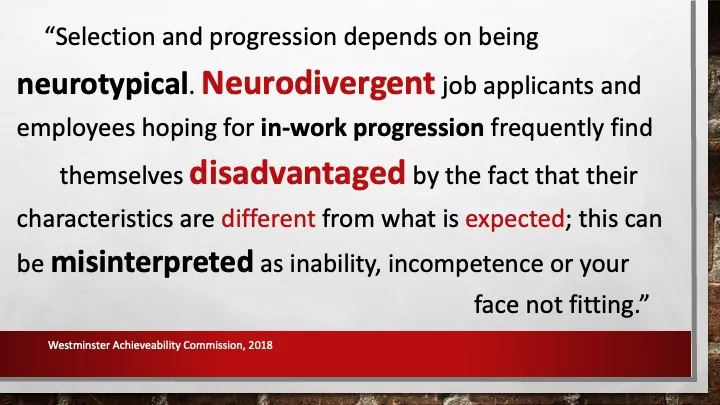
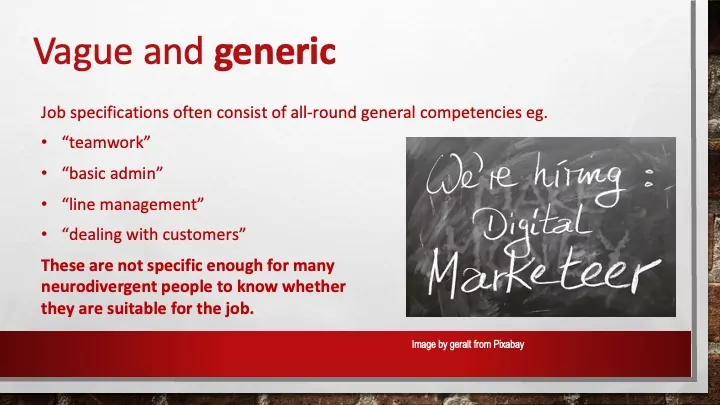
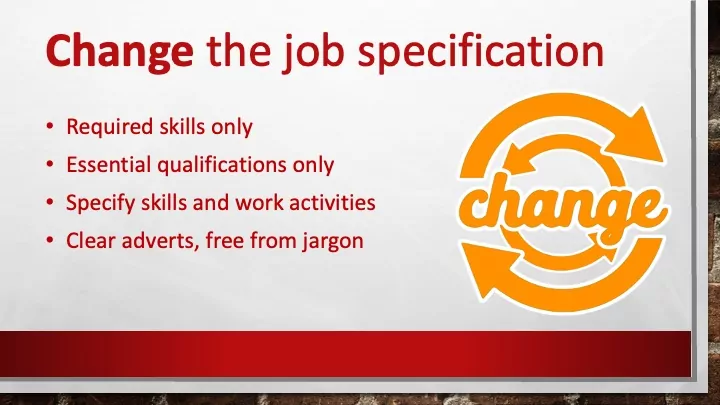
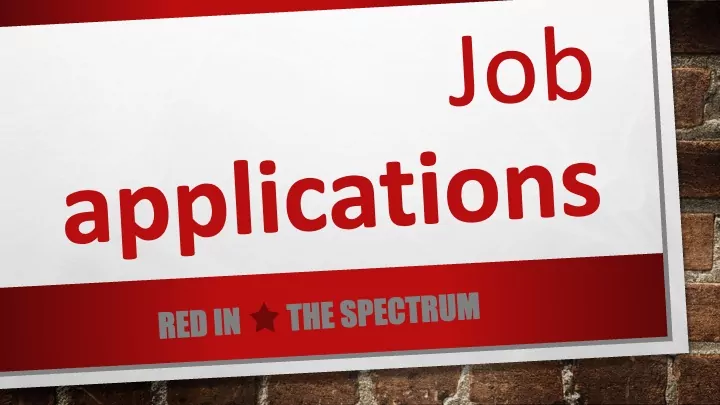 Neuro-inclusive recruitment: Job applications
Neuro-inclusive recruitment: Job applications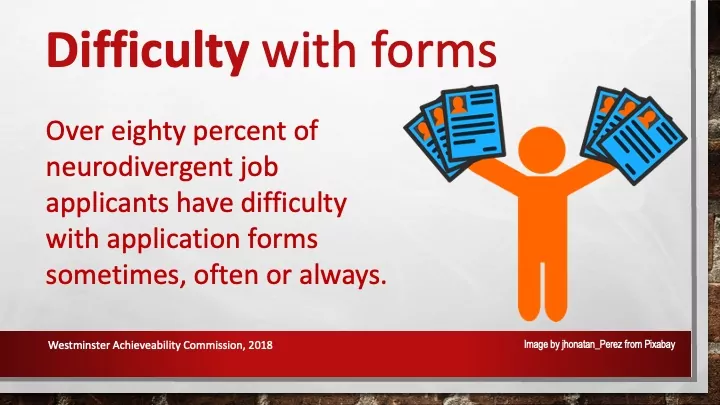
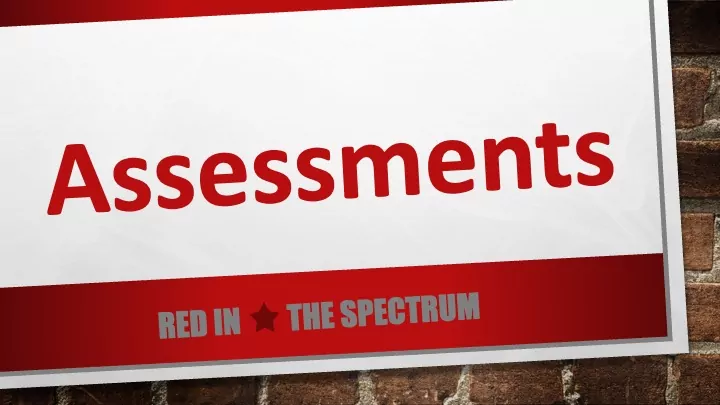 Neuro-inclusive recruitment: Assessments
Neuro-inclusive recruitment: Assessments